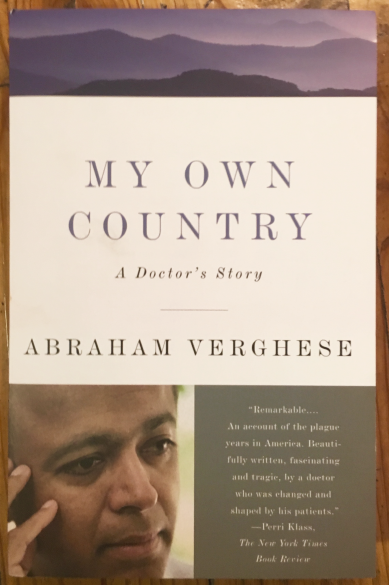Today we review the final chapters, 19-31, of “My Own Country: A Doctor’s Story” by Abraham Verghese.
Summary
The concluding chapters of “My Own Country” remind us that there is no satisfying conclusion to the AIDS epidemic yet. Dr. Verghese tells the stories of several patients’ decline and deaths, and relays his concern for surgeons risking infection while operating on HIV/AIDS patients, even when precautions are taken. But despite the fears some of the surgeons may have felt, none declined care to HIV patients or showed signs of operating any differently. In addition, the Tri-City AIDS Project (TAP) support group continued to grow and help many of Dr. Verghese’s patients find solidarity and support.
Without much resolution, Dr. Verghese tells of his decision to leave Tennessee and continue the fight against AIDS in Iowa with an established team. Saddened by the loss of his patients and friends to the virus, he left to find new determination but not without shame and guilt for the decision. Although the fight against AIDS is far from over, he believes that patients will find a more accepting, better equipped town and community than when he first arrived.
Themes
Fear and Death, Caretaking, Prejudice, Hope and Possibility
Powerful Lines
- Death is not new to me or to any doctor. But nowadays, you get cancer and you die with honor, often having lived an almost full life span. With HIV infection, you have to fight to salvage your honor, and for the most part you die young. (321)
- In the hospital it was almost as if he had no existence beyond his label of ‘homosexual.’ The ‘AIDS’ was an afterthought. If he had hobbies, aspirations, foibles and eccentricities, a special talent, these had been discarded in the lobby. (325)
- When we first opened the TAP office, I worried about things like a pipe bomb every time I unlocked the door. And I was so hurt by the questions being asked about just renting an office space. My brother has AIDS. And of course he would be coming to the office. These people were acting like he was radioactive or worse, that if he entered the building it would contaminate the whole place. (352)
- On my drive home I kept thinking of Norman’s last hours. It wasn’t at all what I had wished for him: the blood flying everywhere, the chaos and confusion of the rescue squad and emergency room, the paroxysms of coughing… All Norman’s courage and dignity–his two assets–could not counter the sheer horror of that moment. He had undergone the jolting ambulance ride, the Code Blue in the emergency room, because he was scared. (371)
- In my waking hours I never understood the absolute terror of finding out you have HIV; in my dreams I understood all too well. (374)
Questions to Ponder
- There is no denying that AIDS brings fear to those infected, their loved ones, and strangers. How can we join together to overcome these fears and instead make progress toward the defeat of HIV/AIDS?
- What does it mean to be a caretaker for our neighbors? Can we provide love and support even when we are not the main source of care?
Challenge
Although HIV/AIDS is not nearly as front and center in the US today, it is a major issue for our neighbors in Africa, and still widely feared and misunderstood. Whether it is HIV/AIDS or any other number of feared and misunderstood issues, consider the ways you can advocate for the humanity and love toward those affected.


